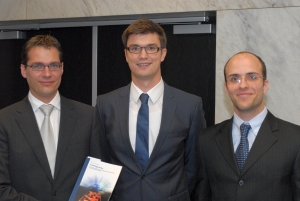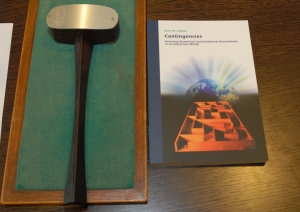Contingencies: Learning Numerical and Emotional Associations in an Uncertain World
 To date, there is a consensus in the social psychological and management literature that in order to optimize judgment quality and performance, decision makers should be held process accountable rather than outcome accountable. That is, one should hold decision makers accountable for their decision process rather than merely the outcomes of their decisions. Yet, if one looks at managerial practice one observes that is more common to hold decision makers outcome accountable rather than process accountable.
To date, there is a consensus in the social psychological and management literature that in order to optimize judgment quality and performance, decision makers should be held process accountable rather than outcome accountable. That is, one should hold decision makers accountable for their decision process rather than merely the outcomes of their decisions. Yet, if one looks at managerial practice one observes that is more common to hold decision makers outcome accountable rather than process accountable.
In his dissertation entitled Contingencies: Learning Numerical and Emotional Associations in an Uncertain World,awarded cum laude, Bart de Langhe, among other things, pinpoints the exact nature of the cognitive process distinguishing process from outcome accountable decision makers. He shows that the superiority of process over outcome accountability in terms of judgment quality is limited to tasks that involve the learning of relatively simple, linear, and elemental relations. Business problems are typically nonlinear, stochastic, interactive, and downright difficult (Kotler, 1971), and managerial judgments and solutions are often based only on the recollection of previously experienced cases and similarity-based reasoning processes (Dane & Pratt, 2007; Kolodner, 1992). De Langhe’s research shows that for these types of problems, process accountability does not yield superior performance compared to outcome accountability.
The results show that because of the complexity and nonlinearity of most business problems, it is justified to evaluate decision makers based on their decision outcomes. The practical implications of this dissertation are of interest for professionals working in the area of pricing, branding, marketing research, and human resources.
Bart de Langhe defended his dissertation on June 10 2011 at Rotterdam School of Management, Erasmus University (RSM). His promoters were <link people _blank>Prof.dr.ir. B. Wierenga and <link people _blank>Prof.dr. S.M.J. van Osselaer. Other members of the Doctoral Committee were Prof.dr.ir. G.H. van Bruggen, Prof.dr. H. Baumgartner, and Prof.dr. D.H.R.V. Smeesters.
About Bart de Langhe
Bart de Langhe was born in Leuven, Belgium on December 21st, 1982. He received his Bachelor’s (cum laude) and Master’s degree (summa cum laude) in Psychology from the Catholic University of Louvain in Belgium. In 2006, he started his Ph.D. research in Marketing at the Erasmus Research Institute of Management. His main research interests concern the influence of learning, memory, and emotion on consumer and managerial decision making. Bart’s work has appeared in leading academic journals such as the Journal of Consumer Research, the Journal of Marketing Research, and Organizational Behavior and Human Decision Processes. He has presented his research at several international conferences and universities (for example, Columbia, NYU, Johns Hopkins, London Business School, INSEAD). He was a visiting research scholar at the University of Chicago Booth School of Business in 2009. From August 2011 he will start as an Assistant Professor in Marketing at the University of Colorado at Boulder.
Abstract of Contingencies: Learning Numerical and Emotional Associations in an Uncertain World
 The ability to learn about the relation or co variation between events happening in the world is probably the most critical aspect of human cognition. This dissertation examines how the human mind learns numerical and emotional relations and explores consequences for managerial and consumer decision making.
The ability to learn about the relation or co variation between events happening in the world is probably the most critical aspect of human cognition. This dissertation examines how the human mind learns numerical and emotional relations and explores consequences for managerial and consumer decision making.
First, we study how uncertainty in the environment affects co variation learning and explore the consequences for consumers’ price-quality inferences and product valuation. Second, we examine how different types of accountability (process versus outcome) and analytical intelligence affect learning and judgment. We highlight the implications for employee performance management. Third, building on associative models of memory, we show that bilingual consumers perceive advertising messages in their native language (L1) to be more emotionally intense than advertising messages in their second language (L2). Finally, we explore the consequences of a greater perceived emotionality in L1 for international marketing research.
The practical implications of this dissertation are of interest for professionals working in the area of pricing, branding, marketing research, and human resources. From a theoretical point of view, this dissertation relates to the fields of judgment and decision making under uncertainty and cognitive psychology.


